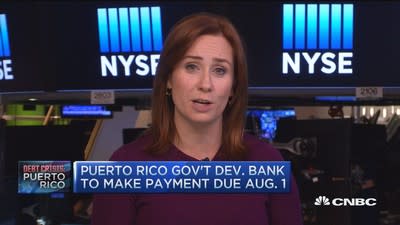How Puerto Rico can get out of its economic 'mess'

Puerto Rico appeared to have missed a debt repayment over the weekend, but while the U.S. territory faces a long battle to right its economic ship, the situation is not hopeless.
Debt restructuring will help the island, but a long-term solution must also include structural reforms to address its labor market and other costs of doing business, experts told CNBC. And even if the U.S. government won't make Puerto Rico eligible for Chapter 9 bankruptcy-as mainland municipalities are-the territory could still potentially get by.
"If Congress doesn't allow for Chapter 9, it's going to be a lot more difficult than if it does," said Juan Lara, economics professor at the University of Puerto Rico, adding that he does in fact expect the U.S. government to allow such filings.
Some have called for Puerto Rico to buckle down on an "internal devaluation"-depressing costs (including wages) so the economy can become competitive-as an alternative to currency devaluation, which would be impossible anyway on the U.S. dollar. Experts, however, told CNBC that internal devaluation would not fix everything.
Read More Why Puerto Rico's debt crisis isn't contagious
"Depreciation is not a possibility, but I don't think they can do it through internal devaluation," said Anne Krueger, a former first deputy managing director of the International Monetary Fund and senior research professor of international economics at the School of Advanced International Studies at Johns Hopkins.
She predicted that many Puerto Rican residents would leave the island if the wage situation worsened appreciably.
Moreover, the territory has "been going through an internal devaluation for years now," the University of Puerto Rico's Lara said. Such a decline has not been intentional policy, he added, but a depression of local costs and profit margins will persist for the near future.
Krueger proposes a series of structural reforms, including changes to labor laws and welfare. "When you're in this kind of mess, every additional thing that helps makes a difference," she said.
Puerto Rico's adherence to the U.S. federal minimum wage is also hurting the island's economy, as it creates a more binding constraint on the territory's weak labor market than it does anywhere in the mainland, Krueger said.
"The single most telling statistic in Puerto Rico is that only 40 percent of the adult population-versus 63 percent on the U.S. mainland-is employed or looking for work; the rest are economically idle or working in the gray economy," Krueger and two colleagues wrote in an economic analysis cited by the Government Development Bank of Puerto Rico.
Read More Puerto Rico default Q&A: 'Sell right now'
After suggesting changes to the minimum wage, the paper suggests that "even if currently employed workers reduce their spending by some fraction of lost earnings, this should be offset-more than offset-by the higher spending of the newly employed."
Still, it's unlikely that Puerto Rico will be able to break away from the current minimum wage, Lara said.
"Certainly the minimum wage is inadequate for Puerto Rico's economy-with the kind of labor market we have, the U.S. minimum wage is too high for market conditions here," he said, but it's "almost impossible to go back."
The Puerto Rican and federal governments are unlikely to allow an exemption to the current minimum wage, Lara said, but the island could potentially be exempt from future increases, and that's really the most it can hope for on that front.
Economics experts consulted by CNBC roundly agreed that Puerto Rico requires some manner of debt restructuring in order to get its head above water. Whether a new arrangement is found through friendly negotiations with creditors or contentious court battles (or some combination of the two) is not yet clear, but one thing is for sure, Lara said: The situation will get tougher on the ground before it gets better.
"We're definitely looking at more austerity, more taxes, more cuts in spending and so forth," he said. "The ideal way to go is for us to get enough relief on the debt side, and we can devote more of that money to get the economy started again."
But even after the stabilization effects of a debt deal and the structural reforms suggested by those like Krueger, Puerto Rico will still need incentives to bring industrial firms to the island, Lara said. He explained that it has "higher operating costs-even with internal devaluation-than Mexico and other countries we compete with."
More From CNBC

 Yahoo Finanzen
Yahoo Finanzen 
